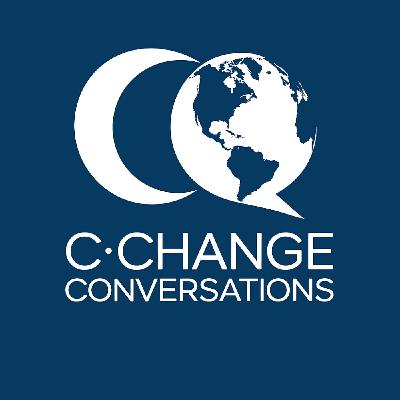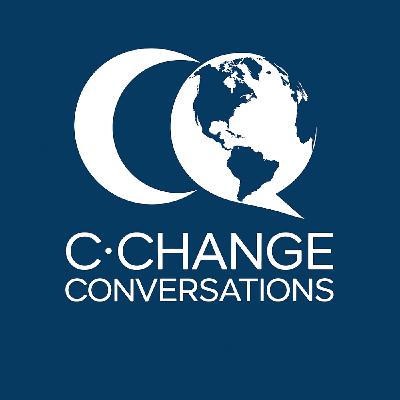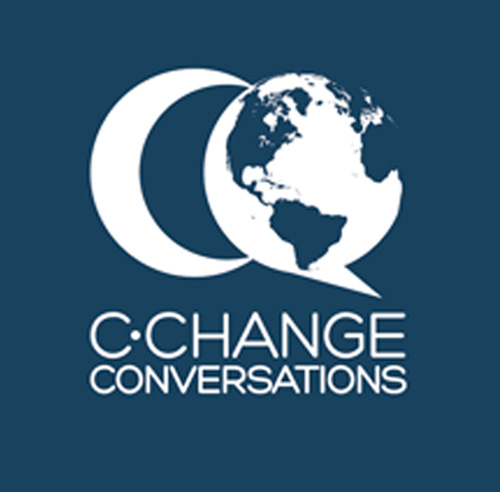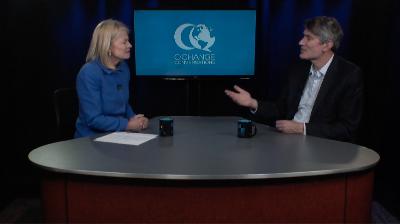Discover C-Change Conversations Podcast
C-Change Conversations Podcast

C-Change Conversations Podcast
Author: C-Change Conversations
Subscribed: 0Played: 0Subscribe
Share
© C-Change Conversations
Description
At C-Change Conversations, we talk about climate change in a way that helps people understand the urgency of the issue without inflaming partisan passions.
cchangeconversations.substack.com
cchangeconversations.substack.com
15 Episodes
Reverse
Kathleen joins Mark Hayes of Glenmede for a wide-ranging conversation about how climate change is transforming the finance sector. They explore the risks and opportunities of the global climate transition, the rise of sustainable investment strategies, and the regulatory and political shifts shaping today’s landscape. The discussion also dives into how corporate leadership in the C-suite is responding to climate challenges, the growing trend of “greenhushing,” and the federal policy changes influencing the pace of climate action. This is a public episode. If you would like to discuss this with other subscribers or get access to bonus episodes, visit cchangeconversations.substack.com
Kathleen Biggins, President and Founder of C-Change Conversations, speaks with Sophie Glovier, C-Change Team Member and Assistant Policy Director of The Watershed Institute, about how to talk to moderates and conservatives about climate change. This is a public episode. If you would like to discuss this with other subscribers or get access to bonus episodes, visit cchangeconversations.substack.com
How is climate change impacting the Real Estate industry? In our latest episode, we explore this topic, as presented by Kathleen Biggins. This is a public episode. If you would like to discuss this with other subscribers or get access to bonus episodes, visit cchangeconversations.substack.com
This is a public episode. If you would like to discuss this with other subscribers or get access to bonus episodes, visit cchangeconversations.substack.com
Turn harmful carbon emissions into fuels or fertilizers that don’t harm our planet? Yes. The process is part of a burgeoning industry called “carbon tech” and the focus of the newest episode of C-Change Conversations: Solutions Series – Ideas, Innovations, and Advancements in the Fight Against Climate Change.We hope you’ll watch (or even just listen as you go about your day) to our interview with scientist Emily A. Carter as she explains why, and how, we must transform the excess carbon in our atmosphere and oceans into marketable products. This internationally renowned expert is Senior Strategic Advisor for Sustainability Science at the Princeton Plasma Physics Laboratory and Gerhard R. Andlinger Professor in Energy and the Environment at Princeton University. She led the development of “Carbon Dioxide Utilization Markets and Infrastructure: Status and Opportunities” to help industry and government decision makers better understand how the technology can contribute to achieving our net-zero goals. In the interview, Emily explains carbon dioxide utilization – the processes of transforming CO2 emissions from burning coal, oil, and gas into useful products – like fuel, fertilizer, plastics, aggregates used in concrete, and even diamonds and vodka. Carbon tech like this can contribute not only to reaching net-zero emissions but also to reducing (but realistically, not eliminating) carbon-based products and systems. Emily believes that this potentially trillion-dollar industry could grow our economy, effectively support the transition away from fossil fuels, and prevent the worst effects of climate change. This is a public episode. If you would like to discuss this with other subscribers or get access to bonus episodes, visit cchangeconversations.substack.com
Insurance rates are rising, coverage is disappearing, and fingers are pointing in all directions. Yes, humans are moving to areas more vulnerable to natural disasters. Yes, inflation is raising the costs of reconstruction. But the most concerning reason insurance is getting so expensive and elusive is that the industry is finally factoring in the real risks of our changing climate.Extreme rains, windstorms, hail, more powerful hurricanes, wildfires, heat, and accelerating sea level rise – disasters that insurance companies link to climate change – are more frequent and ferocious than they were in the past. Our homes, communities, and infrastructure were built for yesterday’s norms, not today’s realities or tomorrow’s projections. That leaves all of us, and our economy at large, very vulnerable.C-Change Conversations is committed to helping people understand how climate change will impact us personally, including what it means for our safety and our wallets. That’s why I was proud to co-present with Steve Fischl, regional product director and vice president at Chubb Insurance, to explore why these challenges are happening, what’s expected in the future, and what we can do to protect ourselves and increase our ability to access adequate insurance.Sponsored by CBIZ Borden Perlman in early November in Princeton, NJ, the discussion was sobering, but necessary. Key takeaways included that these super-charged disasters are happening everywhere and none of us is safe. Our insurance costs are even impacted by disasters in far-off parts of the world because those disasters drive up costs from reinsurers, which in turn ratchets up costs for US policyholders. The real solution is to stop emitting greenhouse gases and lessen climate change’s impacts everywhere. In the interim, we must invest in infrastructure and systems that will enable us to be more resilient when these disasters hit.We won’t meet the challenge if we don’t understand the enormity of our financial and personal risk. The effects of climate change on the insurance industry is a “canary in the coal mine” – a clear indicator that we are at real risk and need to take action. This is a public episode. If you would like to discuss this with other subscribers or get access to bonus episodes, visit cchangeconversations.substack.com
You’ve got questions, and we have answers. No question is too simple or complex for our panel of science advisors who stand ready to field your questions about climate change.James W. Porter, PhD, answers a question about whether the scientific community agrees that climate change is caused by human activities. Dr. Porter is a renowned marine ecologist who has devoted 50 years to studying coral reefs and marine ecosystems. A Josiah Meigs distinguished professor, emeritus, at the University of Georgia, he is also the award-winning filmmaker of Chasing Coral.Read other Q&A here, and don’t be shy about asking your questions here.Warmly,The C-Change Conversations TeamQ: It is hard to imagine that at any time in Earth’s history, the climate was “consistent.” Ice ages, land shifts, etc, were not caused by humans. How do we know this current climate shift is not just another natural course of the planet? Aren’t there many different scientific opinions – all claiming the others don’t account for all the facts?A: The scientific community is no longer divided on the fact that humans are responsible for the climate change we are experiencing. Within the last five years, in fact, the evidence has become so overwhelming that everyone in the scientific community agrees that the world is warming and that greenhouse gases – including carbon dioxide, methane, and others – are to blame. We now have the same degree of certainty that the Earth is warming as we do about the existence of gravity.While it is true that over hundreds of millions of years, the Earth’s climate does shift, the changes (warming) that we are seeing now are happening so quickly that there are no geological precedents for them – they are not natural climate cycles. Humans are, in fact, having an effect on the planet on par with a meteorite strike. This is a public episode. If you would like to discuss this with other subscribers or get access to bonus episodes, visit cchangeconversations.substack.com
Carl Ferenbach, of Berkshire Partners and The High Meadows Institute, speaks of the early stage companies focused on clean energy and efficiency. A leader in business, finance, environmental advocacy and philanthropy, Carl, in conversation with Kathleen Biggins of C-Change Conversations, addresses the risks and opportunity in climate change mitigation and investment opportunities. This is a public episode. If you would like to discuss this with other subscribers or get access to bonus episodes, visit cchangeconversations.substack.com
One of the best parts of my work is talking to and learning from experts who see climate change through the lens of how it impacts our economy, health, and national security. Andrew Winston, for example, is a knowledgeable and articulate expert on the nexus between business and climate change. An acclaimed author who advises multinational companies on how to understand and benefit from major trends, he’s adept at looking at sweeping generalizations and extrapolating how they will impact business on a very granular level.Andrew sees climate change as society’s biggest challenge and clearly communicates how business has exacerbated the problem but also has the potential to ameliorate it.I had the chance to interview him about why it is in businesses’ best interest to aggressively move to reduce climate risks – for their own bottom line and for the rest of society. This is a public episode. If you would like to discuss this with other subscribers or get access to bonus episodes, visit cchangeconversations.substack.com
It's easy to talk about topics with people who already agree with you, but when it comes to climate change, the conversation can get uncomfortable very quickly. In this episode, Founder and President Kathleen Biggins explains a few tricks that have helped C-Change Conversations discuss such a difficult topic for the past decade among audiences with vastly differing opinions. This is a public episode. If you would like to discuss this with other subscribers or get access to bonus episodes, visit cchangeconversations.substack.com
C-Change Conversations’ Kathleen Biggins sits down with New York Times award-winning Reporter David Gelles for an in-depth discussion about climate, capitalism, and culture, areas of expertise that he delves into in his forthcoming book, “Dirtbag Billionaire: How Yvon Chouinard Built Patagonia, Made a Fortune, and Gave It All Away.” This is a public episode. If you would like to discuss this with other subscribers or get access to bonus episodes, visit cchangeconversations.substack.com
Do you know the difference between climate and weather? Are you concerned about the weather wackiness we’re experiencing? Nationally acclaimed meteorologists Jeff Berardelli and Chris Gloninger share their expert, scientific take on how climate change is affecting both our everyday and long-term weather and what we might face in the not-so-distant future. This is a public episode. If you would like to discuss this with other subscribers or get access to bonus episodes, visit cchangeconversations.substack.com
This is a public episode. If you would like to discuss this with other subscribers or get access to bonus episodes, visit cchangeconversations.substack.com
Welcome to the C-Change Conversations Podcast, where we explore real-world solutions to the climate crisis with the experts and innovators working to make them a reality.In this throwback episode, C-Change President and Founder Kathleen Biggins sits down with Professor Emily Carter, a pioneering energy scientist and leading voice on carbon utilization. Together, they unpack the rapidly evolving field of carbon tech, transforming harmful CO₂ emissions into products like fertilizer, aviation fuel, vodka, and even diamonds.Professor Carter brings decades of experience in sustainability science, from leading Princeton’s Andlinger Center to her current role at the Princeton Plasma Physics Laboratory. Her message is clear: carbon dioxide isn’t just a pollutant, it’s a resource waiting to be repurposed.🎧 Listen to Learn:* How carbon utilization could offset up to an eighth of global CO₂ emissions by 2050* What it really takes to turn emissions into products from diamonds and vodka to fertilizer and fuel* Why direct air capture and ocean-based carbon extraction might be the next gold rush* How microbes and bacteria are being used to brew aviation fuel from thin air* Why working with fossil fuel infrastructure could accelerate, not stall, climate progress* How clean electricity and carbon tech create a win-win for the economy and the environment* Why innovation, not sacrifice, is the heart of a hopeful climate futureThis episode offers a fascinating, science-forward look at how we can mine our emissions instead of our Earth, and build a better future in the process.Learn more about our mission to promote fact-based, non-partisan climate education: www.c-changeconversations.org This is a public episode. If you would like to discuss this with other subscribers or get access to bonus episodes, visit cchangeconversations.substack.com
In this episode of C-Change Conversations, C-Change founder Kathleen Biggins sits down with Sir Stephen Cowley, director of the Princeton Plasma Physics Laboratory and one of the world’s leading voices on nuclear fusion. Together, they unpack the science behind fusion, why it's often called the "Holy Grail" of clean energy, and how close we really are to making it commercially viable.Sir Stephen shares insights on:* What nuclear fusion is and how it differs from traditional nuclear fission* Why fusion is safe, carbon-free, and potentially limitless in its power* How fusion complements renewable energy sources like wind and solar* The biggest hurdles still facing fusion and the breakthroughs pushing us closer* The U.S. government’s investment and bipartisan support for fusion technology* What the global race to develop fusion means for American leadership in energy innovation* How fusion could reshape the grid and provide on-demand, firm energy when renewables fall shortKathleen and Sir Stephen also discuss the cost, public perception, and strategic role of fusion energy in reaching net-zero emissions, especially as part of a comprehensive, diversified energy strategy.Connect with Kathleen and C-Change at c-changeconversations.org. This is a public episode. If you would like to discuss this with other subscribers or get access to bonus episodes, visit cchangeconversations.substack.com








